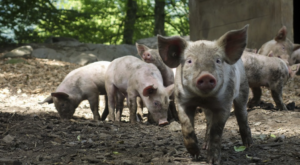Surprising as it may sound, a 50 pound piglet, if given access to constant food and water, will grow the 250 pounds (market weight) in approximately 100 days. Talk about a growth spurt. – Wikihow.com
If you have a pig, your food waste is reduced to zero. They will eat anything we eat, as well as almost everything else vegetable and leafy from your garden. If you are worried you will become attached to your pig because of the 1995 movie ‘Babe’, you could choose to raise and sell piglets rather than keeping your pigs for meat. Or buy an ugly Jabba-the-Hutt breed that you won’t become attached to!
Advantages include:
- Zero food waste. Pigs will eat any and all scraps or leftovers, of any kind.
- Excellent meat, and growth speed
- Many breeds available, to suit your situation
- Intelligent – pigs may not look it, but they can be quite sweet and friendly
- Raising one pig for sale can entirely pay for you to raise a second pig
- Can be raised in a small pen, or virtually any free-range environment
- Can clean up old, harvested gardens or crops,
Disadvantages include:
- Smell and general filth if kept in a pig pen
- Can get sun-burnt if exposed to the elements
- Intelligent – escape artists
- Intelligent – can be hard to part with. Do not become attached to a pig you don’t plan to keep and breed.
- Can be destructive to pasture land, as they like to dig and root around
- Wallowing and other pig business can compact soil, some soil types more than others
- Manure may have parasites – see below
Manure
Good Agricultural Practices advises pig manure not be used even in compost. (Same with dog and cat manure.) Why? Intestinal parasites may survive composting. It’s the heat generated in the composting process that destroys pathogens in the manure. For this reason, fresh manure shouldn’t be used in a garden for at least 3-4 months before harvesting. That certainly makes quick maturing crops like radishes, lettuces, and other greens a challenge for food safety after letting hogs clean up the garden over the winter. – reformationacres.com
Pig manure is lower in nitrogen than other manures. Cow manure has a nitrogen content of 1.1 percent; Poultry contains 2.8 percent nitrogen; Rabbit manure contains 2 percent. Pig manure? Comes in at a whopping 0.4 percent nitrogen. It would be a good supplement for your compost piles and fallow land, but perhaps not the best thing for a functioning vegetable garden.

